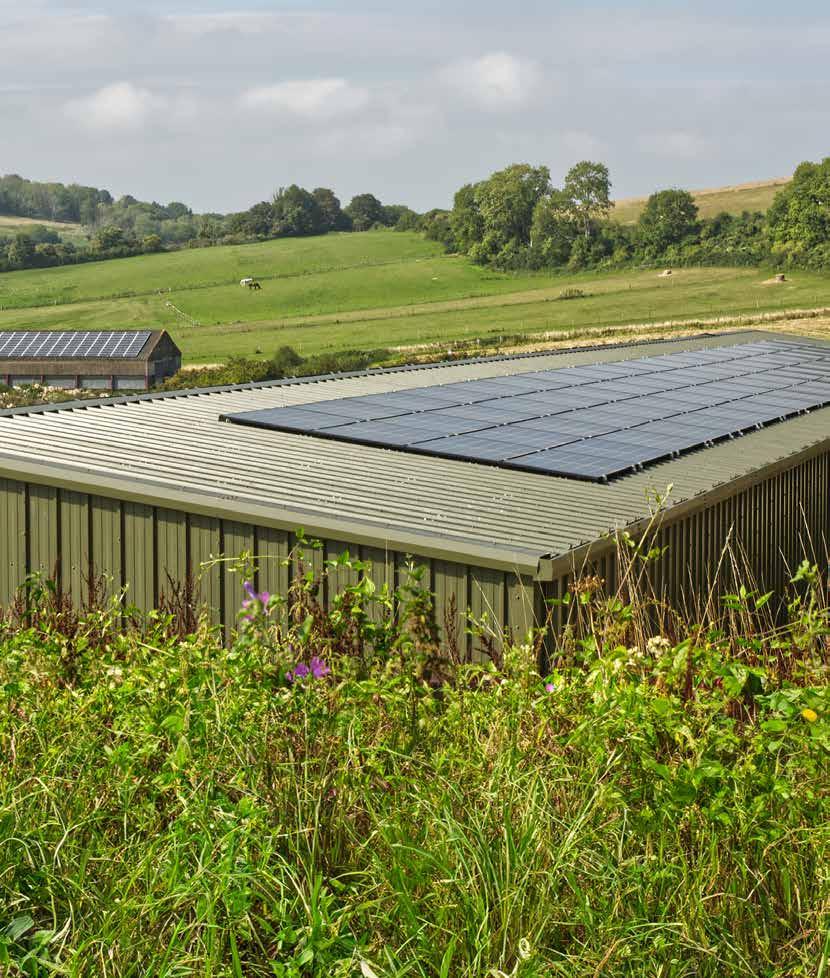




Enjoy the convenience of your own charging station, ensuring your EV is always ready for the road.
Scalable and accessible charging options for your customers, employees and visitors.
Unlock a new income stream by leasing your land for EV charging points.
If you’re thinking about making the switch to electric vehicles but aren’t sure, or need to present a full business case, it might be worth having us crunch the numbers to see if it’s right. Get in touch with the team today!
024 7669 6512

I’m thrilled to have this opportunity to report on the remarkable success of the NFU Energy Buying Groups, which have been instrumental in saving NFU members substantial amounts on their energy bills.
By pooling together as many NFU and NFU Scotland members as possible, and negotiating bulk prices with our partner suppliers, we’ve been able to secure savings of at least 10% on normal one-off contract prices. Our strong relationships with suppliers and collective buying power means NFU members are always getting the best possible deal for their energy needs.
With more and more suppliers wanting to work with us, we’re seeing our partners offering their most competitive
Tim Crocker, NFU Energy Managing Directorrates yet, whilst also offering added incentives including vouchers, bill credits and low standing charges to name a few, exclusively to NFU and NFU Scotland members.
As we chart our course towards a greener future, we highlight why it makes business sense to embrace sustainability. Our easy-to-navigate road map on pages 4-5 showcases how cutting costs and carbon out of your business can significantly strengthen your bottom line. Through our suite of services and close connections with NFU policy teams, we stand ready to support you every step of the way, offering tailored solutions to enhance sustainability and profitability within your operations.


NFU Energy manages over 17 , 054 energy contracts on behalf of NFU members
£28,000 worth of vouchers have been distributed to members within the NFU Energy Buying Groups
NFU Energy has saved one customer £15,000 on their annual energy costs by reducing their standing charges 24 hour
In today’s era of environmental consciousness, the journey towards Net Zero emissions stands as one of the main goals for businesses across all industries, recognising the importance of sustainability, not just as a moral obligation but as a strategic imperative for long-term viability.
Government initiatives such as the Streamlined Energy Carbon Reporting (SECR) and the Energy Savings Opportunity Scheme (ESOS) mandate large energy users to conduct rigorous assessments of their energy consumption and formulate robust energy-saving strategies. These initiatives enable businesses to enhance energy efficiency and mitigate greenhouse gas (GHG) emissions, aligning with broader environmental goals.
For farmers and growers, the journey to Net Zero is not just a commitment to sustainability but a testament to stewardship of our countryside. However, navigating the complexities of energy management can be daunting, and with the increased pressures from the supply chain to ‘go green’, it’s now more important than ever for agriculture to future-proof their businesses by adopting more sustainable practices.
Recognising this challenge, NFU Energy has meticulously crafted a step-by-step guide to assist businesses in cutting cost and carbon from their operations, offering practical insights and actionable strategies to navigate the path to sustainability with confidence and clarity.

The process of reducing emissions usually starts with carbon accounting. This is measuring the total GHG emissions caused directly and indirectly by a site or a business and is expressed as tonnes of carbon dioxide equivalent. The carbon equivalent emission figure then acts as a benchmark against the effect of various changes and improvements in subsequent years.
NFU Energy’s expertise in carbon accounting offers businesses invaluable insights into their emissions profile. Whether it’s selecting the right carbon calculator or embarking on a bespoke full calculation project, NFU Energy equips businesses with the knowledge needed to assess their environmental impact effectively.
Metering and monitoring play a vital role in understanding your energy consumption patterns and identifying areas for improvement. Businesses gain real-time insights into their energy usage, and can facilitate the detection of anomalies and inefficiencies, allowing them to promptly address issues and minimise wastage. Energy audits are also a great way to get an in-depth assessment of where, when and how you use energy – and potentially waste it – within your business.
NFU Energy’s on-site energy audits involve the use of specialist equipment such as thermal imaging to pinpoint energy leaks and can accurately monitor internal environmental conditions such as temperature, pressure, flow and humidity. This helps to uncover hidden opportunities for energy savings and improvements in efficiency, essential for ESOS and SECR compliance. The improvements identified and savings made as a result generally covers the cost of the audit with the opportunity to significantly reduce your annual energy spend.
Once you’ve got a handle on understanding your energy consumption patterns, you may be wondering what renewable energy solution is best for your business. Different technologies and system set-ups each have their own advantages and are likely to perform differently in various situations. We recommend a feasibility study to identify the most viable renewable energy solution for your operations. Our studies cover three key areas:
• Technical analysis – Our experts assess various renewable energy technologies to determine which one is the most suitable for the specific operational requirements. This assessment involves evaluating factors such as resource availability (e.g., solar irradiance, wind speed), site characteristics (e.g., land availability, topography), and the technical compatibility with existing infrastructure.
• Economic assessment – This involves calculating the upfront costs associated with purchasing and installing the necessary equipment, as well as estimating ongoing operational and maintenance expenses. Additionally, our experts analyse the potential savings on energy bills over the system’s lifespan and calculate the payback period – the time it takes for the accumulated savings to offset the initial investment.
• Logistical considerations – Practical implementation of the chosen renewable energy solution involves addressing regulatory requirements, securing permits, and complying with zoning regulations and environmental standards. Additionally, businesses must address logistical challenges such as site preparation, transportation of equipment, and grid connection. Grid connection feasibility is particularly crucial, as it involves assessing the capacity and stability of the existing electrical infrastructure to accommodate the renewable energy system.
By assessing the feasibility of proposed renewables projects, NFU Energy enables businesses to make informed decisions that align with their business objectives and environmental goals.
Transitioning to renewable energy sources is a pivotal step towards Net Zero; however, it can be daunting when not knowing which renewable energy installer to progress with.
NFU Energy’s Renewable Energy Solutions service offers businesses one-stop-shop access to a list of accredited installers for solar, wind, battery storage, heat pumps, anaerobic digestion, and electric vehicle charging points. We can also help point you in the right direction for securing finance and insurance, as well as providing comprehensive support at every stage of the renewables journey to ensure a seamless transition to generating your own energy.
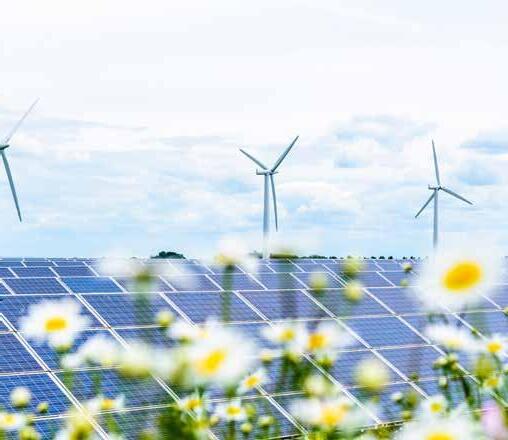

Already generate your own energy?
Then have you considered Renewable Energy Guarantees of Origin (REGOs)?
REGO certificates are issued to eligible generators of renewable electricity. For each megawatt-hour (MWh) of electricity businesses produce, they will receive one REGO certificate. These certificates provide evidence that the energy was generated from renewable sources, such as wind, solar, hydro, or biomass.
REGOs play a vital role in supporting the growth of renewable energy and incentivising investment in clean power generation. You don’t need to be Feed-in-Tariff (FiT) or Renewable Obligations (RO)-accredited to benefit from REGOs. The chances are, if you have FiT or RO accredited assets and aren’t claiming REGOs, you’re already well on the way to being able to.
Our team are well-versed in the intricacies of REGOs. Talk to us today and unlock the value that REGOs can offer.
For more information, visit www.nfuenergy.co.uk or call the team on 024 7669 6512.
Hello, we are Tomato Energy.
We provide dynamic, flexible electricity,withtariffstailored to suit rural businesses and communities.
Solar PV,battery storage and fixed electricity bundles are just some of the reasons whyrural, off-gas businesses are switching to Tomato Energy forcost-effectiveand sustainable living.

See substantial savingsonelectricity with this valuedriven tariff.Off-peak ratesatpeaktimes tailored to fit around your business needs.
Reduce your environmental impact whilst saving on your business energy.Carbon and cost-cutting, designed forAgribusiness.

Tomato Energy Personalised Business Tariffslet youcontrol howand when youuse electricity:
Solar PV,battery,and electricity bundles forafixedmonthly fee and little or no upfront cost.
Low-cost electricity with minimal environmental impact. Our Harvest forBusiness time-of-use tariff helps youoptimiseenergy usage and stabilise your energy costs.
In response to the recent Call for Input on Standing Charges issued by Ofgem towards the end of 2023, the NFU Energy team voiced critical concerns and proposed actionable solutions tailored to the challenges facing its customers, primarily comprising agricultural and horticultural sectors.
The agricultural industry, renowned for its high overhead costs, has been significantly impacted by the recent energy crisis and subsequent changes to standing charges. At NFU Energy we acknowledge the necessity of network upgrades and recognise that costs may inevitably be passed on to end-users. However, the disproportionate distribution of these costs among non-domestic customers has raised significant alarm bells within the agricultural community.
Highlighting the crucial role of agriculture and horticulture in food production and its contribution to reducing environmental impact through local food production, we emphasised the potential ramifications of increased electricity costs on food prices and national food security.
Key Issues Identified:
• Prohibitive Maximum Import Capacity (MIC) banding rules: Many customers find themselves classified into higher bands than necessary, resulting in inflated costs.
• Disproportionate impact on seasonal users: The banding model based on peak demand disproportionately affects seasonal users of high-consumption equipment, such as grain dryers, leading to substantial increases in standing charges.
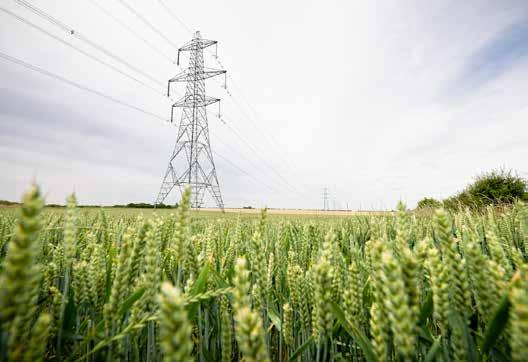
To address these challenges, we propose a series of measures aimed at achieving a fairer and more equitable distribution of costs:
• Standing charges based on annualised average: We advocate for basing standing charges on an annualised average rather than peak demand to prevent occasional high demand from disproportionately impacting bills.
• Reforming banding-moves: We suggest revising requirements around re-banding to reduce the threshold for moving bands and assessing actual peak demand more accurately.
• Increased banding segmentation: We recommend increasing segmentation of standing charge bandings to better reflect customer usage patterns.
• More frequent banding changes: Proposals include increasing the frequency of banding changes and potentially automating these changes on a quarterly basis to better align with seasonal usage patterns.
• Removal of standing charges from fixed contracts: We suggest separating standing charges from fixed rates in contracts to reflect the dynamic nature of third-party costs.
• Support for renewable generation: To encourage continued renewable energy generation, we propose measures such as subsidies or reduced standing charges for renewable energy producers.
Our response to the government consultation underscores the urgent need for reforms in standing charges to alleviate the adverse effects on nondomestic customers, particularly those in the agricultural sector.
Joshua Robinson, Head of Contract Sales at NFU Energy said:
“Our response to the government consultation highlights our commitment to safeguarding the interests of our customers. Our goal is to alleviate the burden of unreasonable energy bills, ensuring uninterrupted operations for our valued clients.”
NFU Energy has recently launched its Standing Charge Banding Reduction Service aimed to assist customers in reducing their standing charge banding and, subsequently, their energy costs. The service guides customers through the process, which involves getting a new agreement with their District Network Operator (DNO) and ensuring that the Line Loss Factor (LLF) accurately reflects their meter’s new banding.
To find out more, call the team on 024 7669 8910 or visit www.nfuenergy.co.uk/services/standing-charge-banding-reduction
At NFU Energy, we understand the importance of making the most out of renewable energy solutions, not only for sustainability but also for financial viability. One scheme that has transformed the renewable energy landscape is the Non-Domestic Renewable Heat Incentive (RHI). Designed to encourage the uptake of renewable heat technologies among businesses, the RHI offers substantial financial incentives for generating heat from renewable sources.
Despite the closure of the RHI scheme to new entrants in March 2021, adherence to RHI regulations remains crucial for ongoing receipt of payments and to stay clear of penalties. We catch up with Thomas Wilkins, Head of Technical Delivery at NFU Energy who has compiled a comprehensive checklist to ensure ongoing compliance for uninterrupted payments and peace of mind.

By following this comprehensive checklist, businesses can ensure full compliance with RHI regulations, maximising the financial benefits of renewable heat technologies while contributing to a sustainable future. At NFU Energy, we are committed to supporting our customers every step of the way on their renewable energy journey. If you have any questions or need assistance with RHI compliance, don’t hesitate to contact us on 024 7669 6512 or email sales@nfuenergy.co.uk
Monitoring and Reporting:
• Record heat meter readings regularly, ideally weekly, and minimum monthly.
• Implement a robust monitoring system to track heat production and consumption accurately for system efficiency.
Regular Maintenance Checks:
• Ensure all renewable heat technologies are properly maintained according to manufacturer’s guidelines.
• Keep records of maintenance activities, including dates and details of any repairs or replacements.
• Ensure your HETAS boiler maintenance is completed annually by an accredited engineer for biomass boilers.
Heat Meter Calibration and Verification:
• Regularly check your heat meters are recording accurately.
• Recalibrate (or replace) heat meters every ten years as per RHI regulations to maintain compliance. Fuel
• Sustainability - Ensure that biomass fuel meets sustainability criteria and you can evidence this if required in an audit.
• Quality – If using wood, ensure your fuel is covered by Woodsure. Keep records of fuel purchases and sustainability certifications for auditing purposes.
System Performance Optimisation:
• Regularly assess the performance of renewable heat technologies installations to identify opportunities for optimisation.
• Implement efficiency measures to enhance heat production and minimise energy wastage.
Compliance Documentation:
• Maintain comprehensive records of all documentation related to RHI compliance, including application documentation and Ofgem correspondence.
Ongoing Eligibility Checks:
• Stay updated with any changes in RHI regulations and eligibility criteria.
• Conduct regular reviews to ensure continued eligibility for RHI payments.
Metering and Monitoring Service Package (MMSP):
• Consider subscribing to an MMSP to streamline metering, monitoring, and reporting processes.
• MMSP providers offer tailored solutions to help businesses meet RHI compliance requirements effectively.
Training and Awareness:
• Provide training to relevant personnel involved in the operation and maintenance of RHI installations.
• Maintain awareness among staff regarding the importance of RHI compliance and its implications for the business.
Professional Guidance from NFU Energy:
• Seek advice from renewable energy specialists or consultants to navigate complex RHI compliance issues.
• Engage with forums to stay informed about best practices and regulatory updates.
Compare and switch your ENERGY CONTRACTS in a few clicks!
NFU Energy’s brand-new energy price comparison tool is here! Giving you the freedom to compare and switch to energy suppliers offering more favourable deals tailored to your business’ needs.
•24/7 access
• Diverse range of one, two and three-year options for farmers and growers
•Potential to unlock significant savings
Compare and save today!
Scan the QR code below. Alternatively call 024 7669 8885 or visit: quote.nfuenergy.co.uk/journey/supply-details
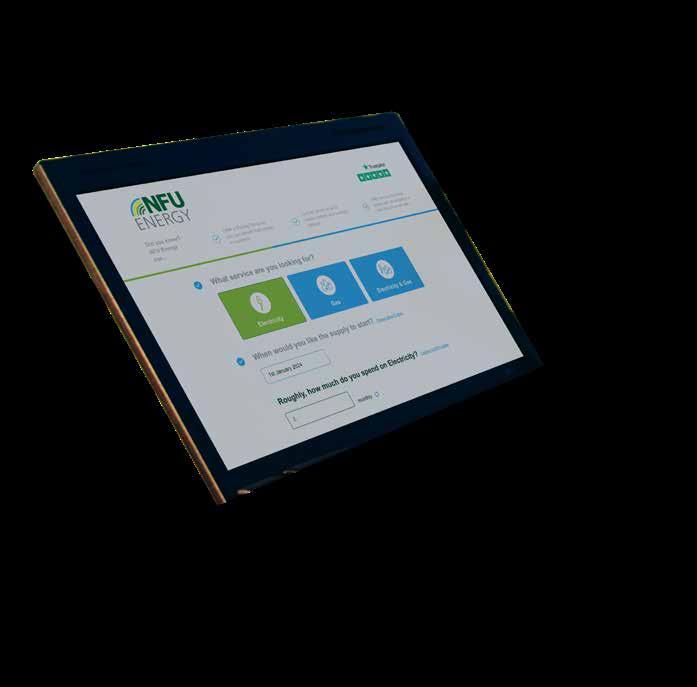

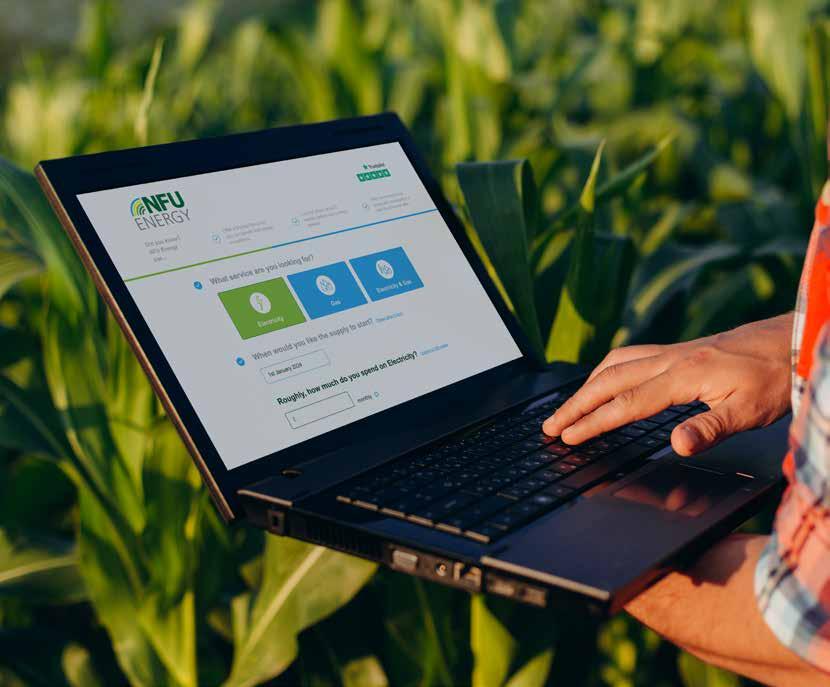
If you generate your own renewable energy, then it’s very likely you’ll be able to benefit from Renewable Energy Guarantees of Origin (REGOs), but what are they? We catch up with NFU Energy’s Verinder Singh, as he sheds light on the significance of REGOs for businesses, their financial benefits, claiming and transferring processes, optimising sales strategy, compliance support, and the importance of timelines in selling REGOs.
Q: What are REGOs?
A: Renewable Energy Guarantees of Origin (REGOs) are certificates issued to eligible generators of renewable electricity. For each megawatt-hour (MWh) of electricity produced from renewable sources like wind, solar, hydro, or biomass, businesses receive one REGO certificate.
Q: What is the significance of REGO certificates for businesses?
A: REGO certificates hold significant importance for businesses on various fronts. Firstly, they demonstrate a commitment to sustainability and help businesses meet regulatory requirements related to renewable energy usage, but also REGOs can provide businesses with a direct revenue stream through their sale in the REGO market.
Q: What are the key steps involved in claiming and transferring REGOs?
A: Claiming and transferring REGOs involves several key steps. Businesses need to submit applications, provide necessary documentation, and adhere to regulatory requirements. NFU Energy simplifies this process by managing REGO applications, claims, and transfers on behalf of businesses.
Q: How can businesses optimise their REGO sales strategy with NFU Energy’s assistance?
A: NFU Energy offers tailored guidance to help businesses optimise their REGO sales strategy. By understanding their energy generation capabilities and the dynamics of the REGO market, we identify the most advantageous selling opportunities for our clients.
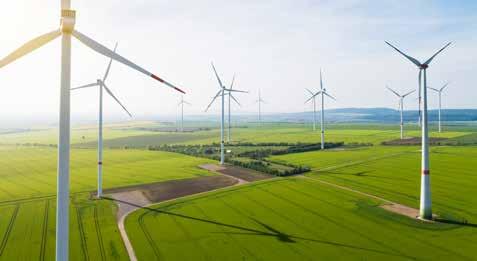

Q: What role does compliance support play in the REGO process, and how does NFU Energy assist businesses in this regard?
A: Compliance with regulatory obligations is crucial in the REGO process. NFU Energy provides comprehensive compliance support, guiding businesses through documentation, reporting, and verification processes.
Q: What is the timeframe for selling REGOs, and why is it important?
A: REGOs fall into compliance periods and must be sold within 16 months of generation. REGOs can drop in price once they fall into a previous compliance period. This timeframe ensures the integrity of the market and encourages timely transactions, providing renewable energy generators with a steady income stream and maintaining transparency in the energy market.
Understanding the intricacies of REGOs is vital for businesses looking to maximise their renewable energy investments. NFU Energy’s expertise provides invaluable guidance to unlock the full potential of REGOs for our customers. Whether it’s optimising sales strategies, ensuring compliance, or managing timelines, NFU Energy is here to assist businesses in leveraging the value of REGOs for both sustainable and financial growth.
Our dedicated team expertly handle every aspect of your energy needs. Working collaboratively with you, we ensure optimal efficiency, cost savings and sustainability by meticulously monitoring consumption, negotiating favourable contracts, and advising on renewable solutions. From procurement to compliance, we streamline processes, mitigate risks, and tailor strategies to your business.
Want to lessen the burden of energy management, then why not talk to us to see if we can tailor a package to suit your needs?

Within my role I lead on projects such as gas class adjustments to enhance billing accuracy and take charge of the daily oversight of energy trading operations for my clients. Our integrated approach combines intraday trading of gas and electricity with Combined Heat and Power (CHP) engine management to maximise profits. By adjusting operations based on market trends, we optimise power generation, reducing costs and capitalising on favourable pricing opportunities. This comprehensive strategy ensures our customers achieve maximum profitability while maintaining operational efficiency.

Having worked in the agricultural and horticultural industry for over 25 years, it’s been a privilege to work with farmers and growers ensuring their energy needs are met. With the recent increase in standing charges, I had investigated several of my clients’ banding gradings. I have managed to reduce the standing charges from £73/day to £11/day for one of my clients, and successfully moved banding for another customer’s site from a LV Band 2 to LV Band 1. This not only reduced the standing charges going forward, but also resulted in back payments for this customer.

One of my key roles as an Energy Account Manager is to renew energy contracts –securing the best deals for my clients while understanding their unique business needs. I accomplish this by building strong relationships with suppliers to negotiate lower fees. With thorough analysis and strategic negotiation, I secure agreements that exceed my clients’ expectations, saving them money and ensuring satisfaction. My commitment to finding value and minimising risk underpins every aspect of my work for my clients’ renewals.

As an Energy Account Manager, I worked with one of my clients to generate income from Renewable Energy Guarantees of Origin (REGOs). Unbeknownst to them, REGO certificates diminish in value after 12 months, despite being valid for 18 months. Recognising this, our team strategically acted to salvage the oldest batch before expiration and successfully sold them at a highly favourable market rate, resulting in a profit of approximately £28,000 for the client. Subsequently, we implemented a structured approach to manage the generation and sale of REGOs on a monthly basis, unlocking a consistent and valuable revenue stream for the client.



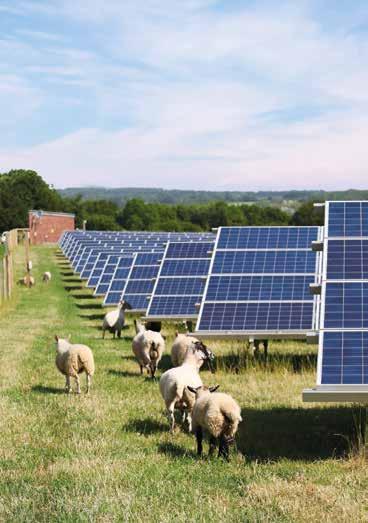
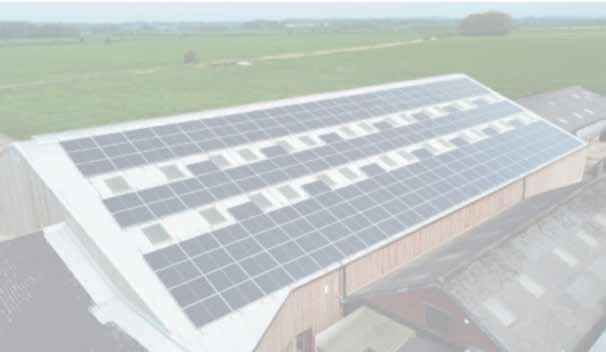
Envirocrops, a pioneering government-funded project dedicated to advancing sustainable biomass solutions, proudly announces the launch of its ‘Find a Supplier’ Directory. This innovative platform serves as a much-needed marketplace and a centralised hub connecting farmers, growers and landowners with top-tier suppliers and consultants specialising in biomass crops products and services.
Key benefits for suppliers include enhanced visibility and networking opportunities within the growing biomass sector. Here’s why joining the Envirocrops Find a Supplier Directory is a gamechanger for businesses:
The Find a Supplier Directory offers suppliers a unique opportunity to showcase their businesses to a targeted audience of farmers and other industry professionals actively seeking biomass crops solutions. The Directory enables visitors to easily find the product or services they need without the hassle.
With the Envirocrops Find a Supplier Directory, businesses can highlight their location and reach potential customers in their local area. Furthermore, the directory opens doors to expanding market reach to new regions, providing suppliers with access to a diverse clientele base across geographical boundaries.
Suppliers can create detailed company profiles within the directory, offering valuable insights into their products, services, certifications and more. With comprehensive company profiles, businesses can effectively communicate their offerings and establish credibility among potential customers.
The Envirocrops Find a Supplier Directory fosters invaluable networking opportunities for suppliers to connect with fellow industry professionals, experts, and potential farming clients.
Envirocrops.com invites suppliers specialising in biomass crops products and services to join its dynamic Supplier Directory with the aim of developing an interactive marketplace for biomass crops production. Whether you’re in need of raw materials, equipment, or expertise, the Find a Supplier Directory serves as your one-stop destination to connect with industry-leading suppliers.
If you’re selling miscanthus rhizomes, willow harvesting services, or if you are a consultant, agronomist or an engineer that services boilers, then Envirocrops needs you! Visit www.envirocrops.com

For more information and to join the Find a Supplier Directory, please visit www.envirocrops.com

Anaerobic digestion (AD) is the process in which organic materials such as food or animal waste are broken down by microorganisms, in an anaerobic (oxygen free) environment – the digestor. This process produces biogas for combustion in a Combined Heat and Power (CHP) unit or boiler, or can be enriched with propane to produce biomethane.
• AD plants produce energy from organic waste, capturing methane to be used as biogas and digestate for use in fertilisers. This can reduce the odour from farm slurries by 80%.
• Methane is 23-times as potent compared to carbon dioxide, and so by not releasing this into the atmosphere, it can help to reduce greenhouse gas (GHG) emissions.
• AD plants kill the seeds of numerous weed varieties, reducing the need for herbicides.
Green Gas Support Scheme (GGSS)
This scheme provides tariff support for biomethane produced via AD, which is injected into the gas grid. It is funded by the Green Gas Levy which is applied to all licenced fossil fuel gas suppliers. The scheme follows the Non-Domestic Renewable Heat Incentive (RHI) which closed to new applicants on 31 March 2021. Registered participants will receive tariff payments for 15 years.
At NFU Energy we can assist businesses with submitting applications to the GGSS and ensuring ongoing compliance through various services and expertise.
To date, NFU Energy’s application on behalf of one of our clients has been the only application to have had full approval by Ofgem and now benefiting from the support.
Road Transport Fuel Obligation (RTFO)
This supports the government’s push to increase the production of green transport fuels. Large fuel suppliers must show that a % of their fuel comes from renewable or sustainable sources. Producers get certificates to show how much green fuel they have produced, which can be traded with companies that need them to meet their obligations under the RTFO.
Green Gas Certification Scheme (GGCS)
This tracks green gas through the supply chain and is a way of evidencing provenance. Each unit of biomethane injected into the grid displaces a unit of natural gas (fossil fuel).

If you’re considering implementing an AD plant, NFU Energy can help. From assessing the feasibility of implementing green gas projects and evaluating the potential returns on investment, to providing expert guidance on the GGSS application, ongoing technical assistance and compliance support, we’ve got you covered.
A carbon footprint is a way of accounting for the greenhouse gas emissions of a business, a product or a service through its entire lifecycle.

Carbon emissions have increased dramatically in recent times – it is becoming common for purchasers to require suppliers to have a carbon footprint of the product they are selling.
• The process of reducing emissions usually starts with carbon accounting. This is measuring the total greenhouse gas (GHG) emissions caused directly and indirectly by a site or a business and is expressed as tonnes of carbon dioxide equivalent. The carbon equivalent emission figure acts as a benchmark against which to measure the effect of various changes and improvements.
• The most widely used accounting standard for carbon emissions is the GHG protocol. This splits emissions into three Scopes.
• Scope 1: Direct emissions from owned or controlled sources.
• Scope 2: Indirect emissions from the generation of energy bought for own use.
• Scope 3: All other indirect emissions (not included in Scope 2) that occur across the value chain of the business, as a result of both upstream and downstream activities.
• Due to the complexity of reporting all three Scopes, it is common practice in carbon accounting to report only on emissions derived from Scopes 1 and 2. Sometimes these, and the upstream emissions from Scope 3, are considered, this is referred to as ‘from cradle to farm gate’.
If you’re interested in learning about your business’ carbon footprint, then NFU Energy has significant experience in carbon accounting. From helping you choose the most appropriate calculator to a full bespoke calculation project, we’ve got you covered.
For agricultural businesses, energy costs can be a large overhead, but could you be spending less on your energy outgoings? Our top tips for reducing energy costs in agriculture will help you to create more sustainable operations for your farm, saving you money and helping the environment.
Old or faulty equipment not only makes completing jobs more difficult but can also use more energy than needed. Keeping up with regular maintenance of your existing equipment will ensure things run more smoothly, as well as helping you save energy.
SOURCE MATERIALS LOCALLY
By sourcing your materials from local suppliers, you can lower transport costs as well as ensuring faster and more reliable delivery and no import taxes. Local sourcing will also help to promote a ‘circular economy’, minimising waste production and over-consumption of energy.
CONSIDER RENEWABLE ENERGY
Farmland provides a great home for renewable energy infrastructure such as solar panels and wind turbines, allowing you to generate green electricity and creating a new stream of income for your agriculture business.
OPTIMISE YOUR HARVEST
By harvesting your crops in optimal conditions, you can reduce the amount of energy you need to use. If your crops are wet, your harvest may use more fuel, so planning your harvest during better conditions will not only ensure better quality yield but will also save you energy.
Switch to an energy supplier that understands your business – at Yü Energy, we strive to help our customers understand and reduce their energy consumption with specialist tools and smart solutions for your energy management.
SCAN TO FIND OUT MORE


